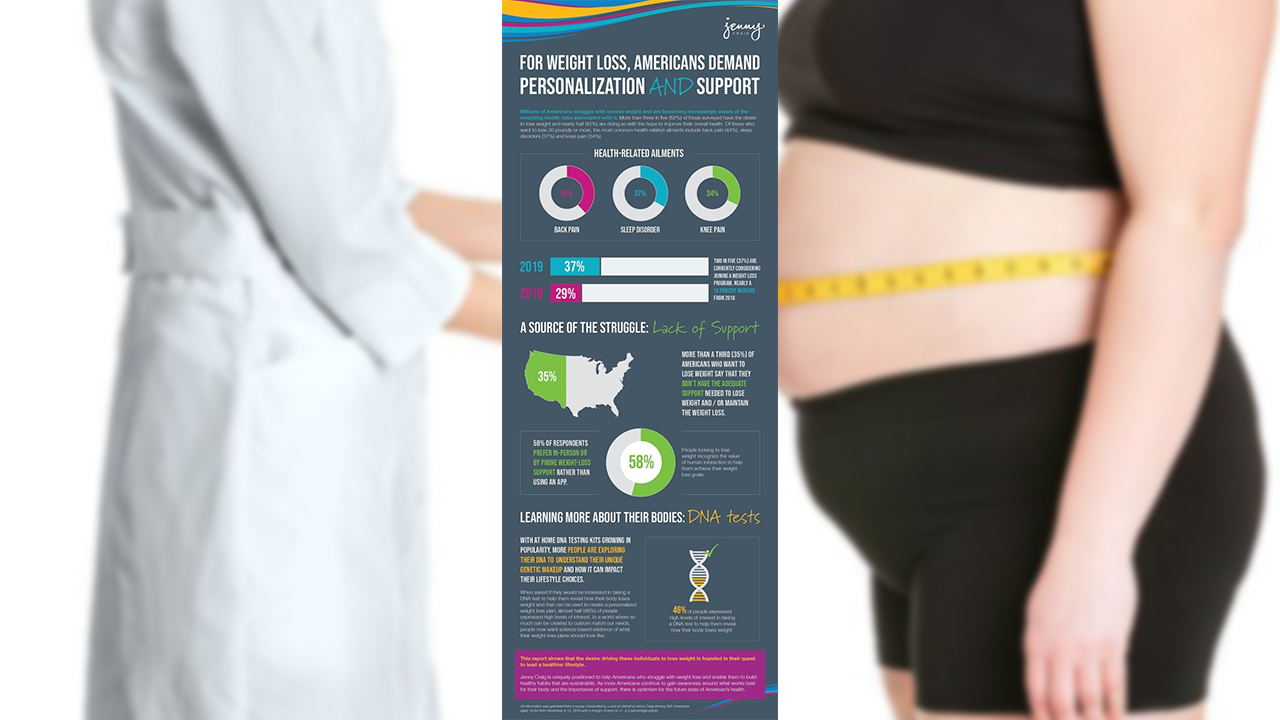A new survey exploring perceptions of weight loss, health and diet trends in the United States has found that despite access to more health information than ever before, Americans continue to struggle with weight and the risks it poses to longevity. The report is the second annual survey commissioned by Jenny Craig, a leader in the weight loss industry for more than 35 years.
According to the report, of those who are looking to lose weight, there has been an increase in consideration to join a weight loss program or diet (8% increase from 2018), as well as an increase in the number of people wanting to lose 50 pounds or more (10% increase from 2018). And while more than three-in-five Americans surveyed (62 percent) have the desire to lose weight, and nearly half are doing so with the aim to improve their overall health, more than one-third say they don't have the adequate support needed to lose or maintain weight loss.
Surprisingly, despite the ever-growing number of health-focused apps, bots and other technology solutions, a majority of Americans revealed that they lack confidence in the role tech could play in their weight loss journey. Fifty-eight percent shared that weight loss support from a trained expert in-person or by phone would help them be more successful at achieving sustainable weight loss versus relying on an app or bot.
The survey found, however, that Americans are eager to embrace more personal forms of innovation when it comes to their health. Nearly half of respondents (46 percent) expressed high levels of interest in taking a DNA test that could help them better understand their genetics and be used to create a personalized weight loss plan. Similarly, 43 percent shared their belief that a weight loss program that is customized to them based on their genetic profile is likely to help them lose weight more effectively.
"Americans are eager to improve their health and wellbeing, but struggle in accessing trustworthy, ongoing support on their journey," said Dr. Pamela Peeke, MD, MPH, FACP, FACSM, chair of the Jenny Craig Science Advisory Board. "This report aligns with what we've seen in clinical trials: one-on-one behavioural support is superior and more effective to technology alone. Further, utilizing a science-based approach, including customizing a weight management program to an individual's unique genetics, can help guide individuals as they strive to achieve sustainable weight loss."
Additional findings from the survey include:
More than three-in-five Americans (62 percent) desire to lose weight and nearly half (45 percent) are doing so with the hope of improving their overall health
Nearly half (46%) of people were very interested in taking a DNA test to help them reveal how their body loses weight in order to have a personalized weight loss plan
More than half (57 percent) of Americans report having been overweight throughout their lifetime
More than a third (35 percent) of Americans who want to lose weight say that they don't have the adequate support needed to lose or maintain their weight
Nearly two in five (37 percent) who want to lose weight, are currently considering joining a weight loss program or following a diet, an 8% increase from 2018
Nearly three in ten (28%) want to lose 50 pounds or more, a 10% increase from 2018
More than half of Americans cite poor eating habits (52 percent) as a top reason for not been able to maintain a healthy weight as an adult
Thirty-eight percent of Americans cite stress as a contributing factor to their struggle with weight
"This annual report provides valuable insight on the needs of those pursuing sustainable weight loss, and the findings confirm that Americans want more than a one-size-fits-all approach," said Monty Sharma, CEO and president of Jenny Craig. "To help them overcome these barriers, we are proud to offer a range of convenient, personalized options, including the DNA Decoder Plan, which utilizes DNA results from each member to customize meal and activity plans based on their genetic profile, as well as meet them where they need us, whether over-the-phone or in-person."

 Report finds DNA-driven health insights, individualized support key to improving health
Report finds DNA-driven health insights, individualized support key to improving health









.jpeg)

.jpeg)










.jpg)




.jpg)

